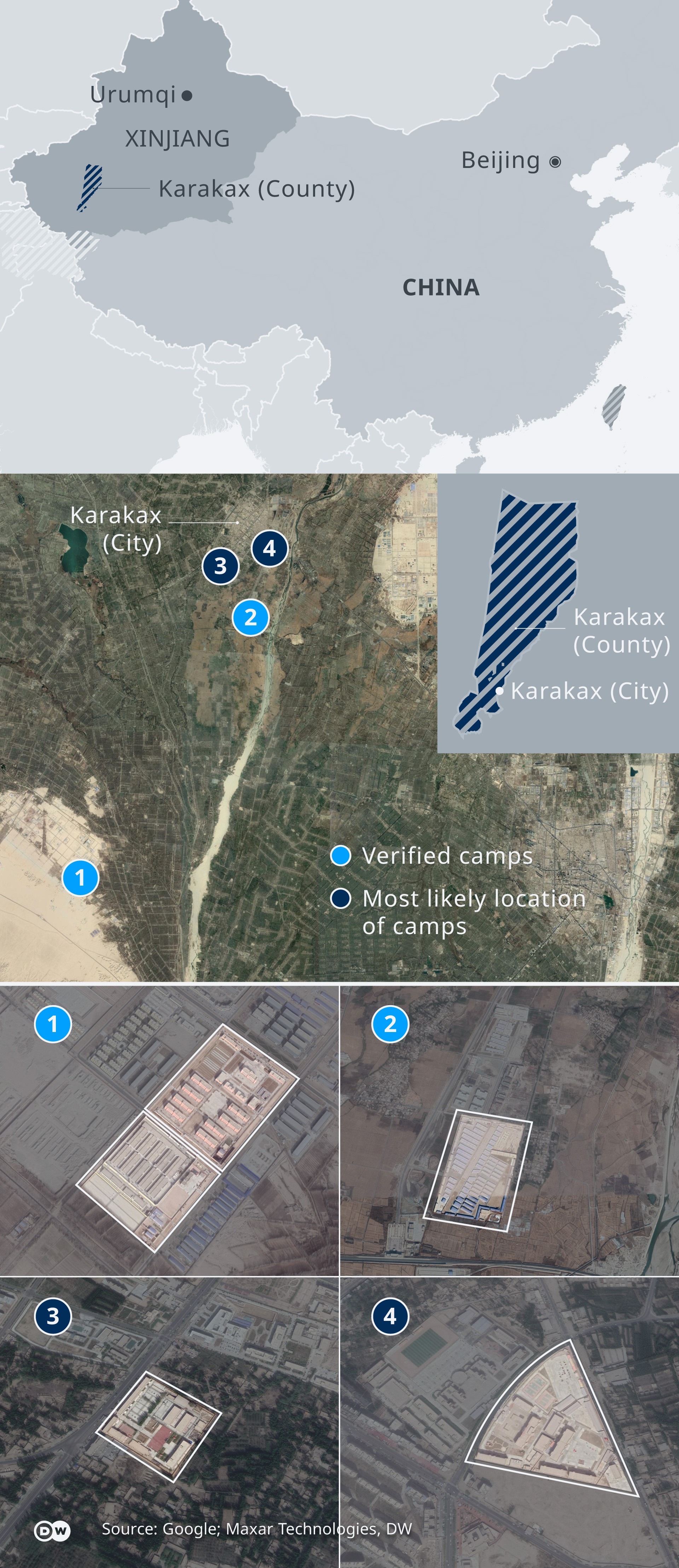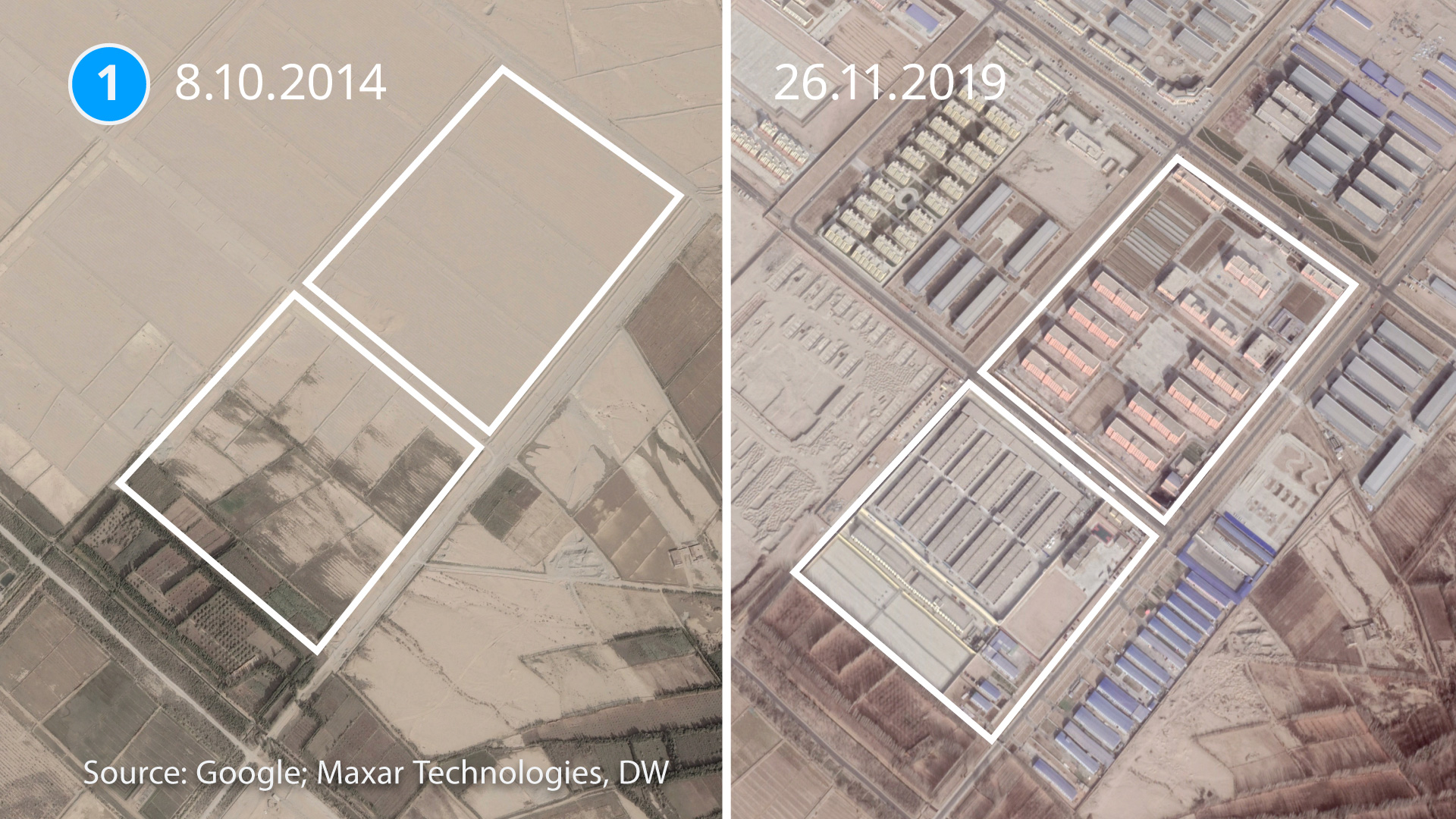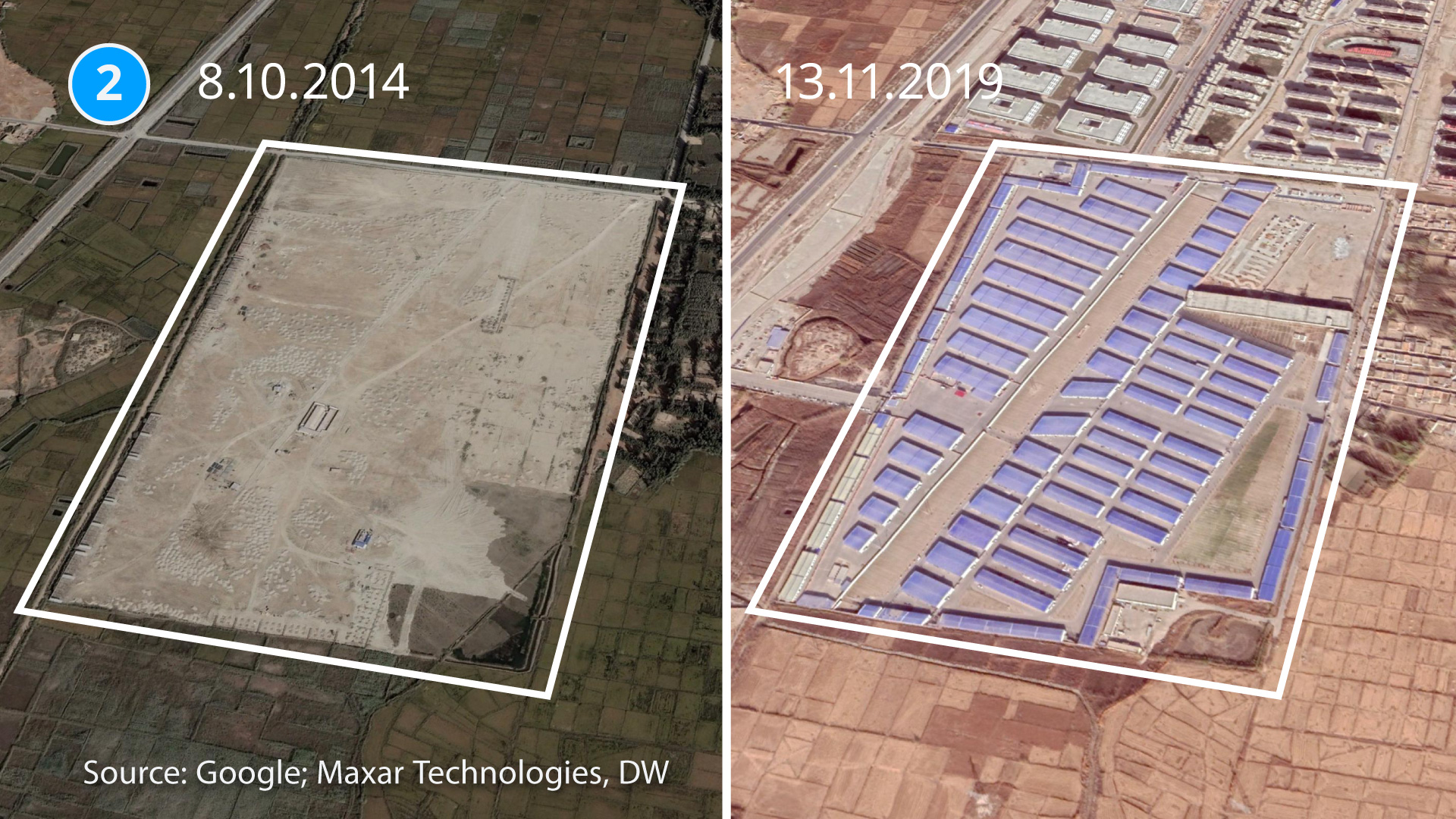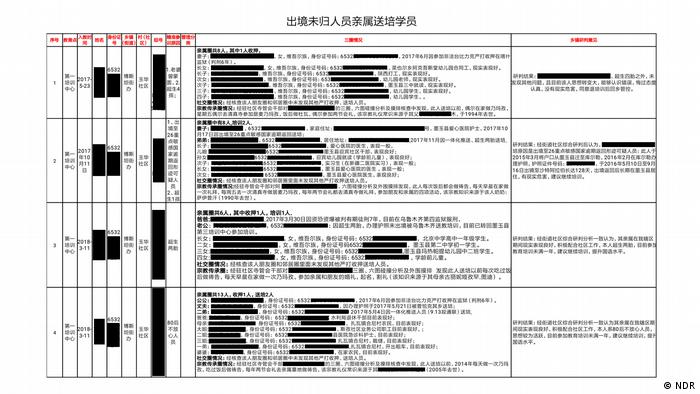An official list of detainees shows how Beijing is tracking every face, every family and every movement of Muslim minority Uighurs in Xinjiang. People have been arrested for growing beards and having “too many” children.
In May 2017, a Uighur man was taken away to a “re-education camp” in China’s northwestern Xinjiang region. As an observant Muslim, the man prayed at home after meals, and sometimes attended Friday prayers at his local mosque. The reasons for his forced internment: His wife had covered her face with a veil and the couple had “too many” children. There was never a trial.
According to a newly leaked document from Xinjiang, the man underwent a “great ideological transformation” in the camp and “realized his mistakes and showed good repentance.” The family’s four boys and two girls back at home all demonstrated “good behavior.”
In June 2017, however, their mother was sent to prison for six years. She was charged with participating in an “illegal religious activity.”
This family’s story is similar to hundreds of cases, which are listed in unprecedented detail.
The leak provides information on why people are detained, while revealing that Chinese authorities are using high-tech surveillance and sheer manpower to keep track of identities, locations and habits of individual Uighur Muslims.
The list of detainees records the fate of 311 people who were sent off to “re-education” for the most innocuous things: growing a beard, fasting, or applying for a passport.
All of them were put in internment camps in 2017 and 2018. The document also lists hundreds of other people connected to them, including children.
DW, together with German broadcasters NDR and WDR and the newspaper Süddeutsche Zeitung, spent weeks translating the document and analyzing the data.
Read more: China is ‘arresting people without any reason,’ says Uighur whistleblower
China’s Xinjiang crackdown goes under the microscope
After a suicide bombing struck Xinjiang’s capital city in May 2014, Chinese authorities installed a system of surveillance and mass-detention centers. The Chinese Communist Party officially calls them voluntary “Vocational Education Training Centers.” According to estimates, at least 1 million of the roughly 10 million Uighurs living in Xinjiang have disappeared into these centers.
In a confidential report compiled in December 2019 by the German Foreign Office, the centers are referred to as being “effectively re-education camps” with “draconian ideological training courses.”
China claims that “the training centers” are an effective tool in a fight against Islamist terrorism.
However, contrary to the official line from Beijing, there is almost no indication in this latest document leak that Chinese authorities in Xinjiang are targeting potential terrorists.
Although three listed people are suspected to be members of an Islamist organization, above all, the document shows that any expression of Islamic religious piety potentially amounts to a crime.
A ‘Vocational Education Training Center’ in Xinjiang, China with watchtowers, walls, fences and barbed wire
The analysis of the document by DW and its partners paints a picture of what many international human rights observers fear is a systematic campaign of ethnic profiling and arbitrary imprisonment outside the rule of law.
The list is 137 pages long and keeps track of minor details, such as videos someone downloaded some six years ago or WeChat messages that were exchanged with friends abroad.
Analysis shows how Uighurs are subjected to draconian methods of tracking and arrest. Facial recognition is carried out with high-tech surveillance cameras. Individual Uighur families are constantly monitored through a network of spies, repeated house visits and collective interrogations.
The document lists the full names, identification numbers and social behavior of more than 1,800 family members, neighbors and friends connected to the 311 main detainees. Hundreds more are listed in lesser detail. The Chinese state employs large numbers of staff to collect detailed data about each Uighur household.
Verifying the Karakax list
The cases listed are all centered on one region: Karakax County, in Xinjiang’s southwestern Hotan prefecture bordering India and Tibet. There are at least five official “vocational training centers” in Karakax County for a population of less than 650,000 people.
The list of detainees mentions four of them. DW was able to verify and locate two of these internment camps using satellite images and government documents. DW was also able to track the likely location of two other camps, using the same methodology.

DW was tipped off about the new document in November 2019 by whistleblower Abduweli Ayup, an exiled Uighur academic currently living in Norway.
Ayup received the PDF spreadsheet from a source whose identity and whereabouts have to remain anonymous for security reasons.
The new leak doesn’t have an official stamp or signature. But its language is similar to other leaks from last year. In November 2019, the “Xinjiang Papers” were published by The New York Times, and the “China Cables” were published by the International Consortium of Investigative Journalists.
Read more: HRW says China poses ‘dire’ threat to human rights
Both reports revealed the overall scale of Beijing’s stranglehold on the Uighur community in northwestern China. This new document specifically outlines the reasons for internment and provides a closer look at Uighurs’ day-to-day reality of living under systematic surveillance.
DW was able to contact family members of detained Uighurs and consulted experts to verify the information in the document. A woman DW met in Istanbul, Rozinisa Memet Tohti, learned through the list that her youngest sister had also been sent to a camp.
 A satellite image of the first of four camps mentioned in the list from Karakax
A satellite image of the first of four camps mentioned in the list from Karakax
“I was really sad. I couldn’t eat or sleep for many days and nights,” she said.
Adrian Zenz, a leading Xinjiang expert from Germany, and the senior fellow at the conservative think tank “Victims of Communism Memorial Foundation” in Washington, has been decoding the new leak since it came to light.
By referencing ID numbers mentioned in the list with publicly available data and other leaked documents, Zenz was able to match hundreds of identities.
“When considering that it contains personal information for over 2,000 people with a considerable degree of complexity, the Karakax List shows a high degree of internal consistency and data validity,” he concluded.
A glimpse of a massive surveillance operation
One case outlined in the new leak is of a man who grew “a long beard,” and whose wife had “covered her face with a veil.”
Based on this profile, Chinese authorities concluded, without much elaboration, that the couple had been “infected with religious and extremist ideas.” The man was sent to a camp. And so was one of his teenage sons.
 A satellite image of the second of four camps mentioned in the list from Karakax
A satellite image of the second of four camps mentioned in the list from Karakax
The case details show that 15 relatives are closely monitored. However, they are described as “behaving nicely,” and all are “actively participating” in daily community service. Therefore, the official recommendation is that the man be sent back to his community for “further surveillance.”
Rian Thum, an expert on China’s Uighur policy at the University of Nottingham, told DW that the monitoring of people’s private lives “is overwhelming” in its level of detail. “I think it is interesting to imagine that these things exist across Xinjiang. The data that is out there must be staggering.”
Read more: China launches compulsory face scans for new phone users
Forced labor in factories
The fate of Uighurs in the camps also depend on the actions of those on the outside. In some cases, the conduct of family members is used as a direct reference on whether an interned Uighur can be “released.”
About two-thirds of the detainees listed were earmarked for release, only to be kept under continuous surveillance, with their freedom of movement strictly curtailed.
In dozens of cases, DW has found reference to a system of forced labor in factories.
One such case of prolonged internment at a factory involves a man detained in May 2018 for contacting his brother, who had fled to Turkey.
According to the document, the detainee therefore “poses a certain level of danger to society.” The recommendation by the “community” is for him to “remain in a factory in the re-education camps.”
‘Illegal’ babies
However, the top cause for arrest of Uighurs from Karakax County was violating China’s official birth control policy by having too many babies.
According to family planning law, Uighurs and other minorities in urban areas are allowed two children, whereas Uighurs in rural areas are allowed three.
And the numbers clearly show that considerably more men than women were interned for violating this family planning law.
The disparity could indicate that the Chinese government considers Uighur men as the primary threat to its control over Xinjiang.
“I think in terms of Islamophobia, men in general, especially young men, are always the targets and seen as potential terrorists,” Xinjiang expert Darren Byler of the University of Colorado told DW.
“My feeling is that the government wants to weaken or diminish the Uighur population as a way of reducing the threat perception.”
DW’s analysis also shows that the Chinese state specifically targets the younger generation. In the document, the term “worrisome person” or “untrustworthy person” is used for people born between 1980 and 2000.
More than 60% of internees are between 20 and 40 years old. “This has major implications for demographics and the birth rate,” said analyst Thum from the University of Nottingham. “If you take a portion — or even the entirety — of a village’s youth, you basically put a pause” on the community’s growth.
‘Criminal’ contacts abroad
Dozens of people listed in the document were arrested for being friends with “a suspicious figure living overseas,” or for going on an Islamic pilgrimage, like the Hajj to Mecca.
In roughly 40 cases, people were also arrested after they applied for a passport.
Chinese authorities have officially deemed 26 countries as “sensitive.” Almost all of them are Muslim-majority, such as Algeria, Pakistan and Saudi Arabia. Any contact with these places is grounds for detention if you are Uighur in Xinjiang.
This list of “sensitive countries” also includes China’s central Asian neighbors like Kazakhstan, where many Uighurs have family and friends, along with cultural and ethnic ties.
“If the Chinese Communist Party is able to completely eliminate the influence of Islam from all elements of Uighur life, then Uighur culture will certainly be hollowed out,” said Timothy Grose, a Xinjiang scholar at the Rose Hulman Institute of Technology in the US.
This is exemplified by the destruction of mosques and Muslim cemeteries in the region.
Is Islam ‘illegal’ in China?
Experts believe that Beijing’s endgame is to uproot Uighurs and other Muslim minorities in Xinjiang from their religion and cultural heritage. Muslims are prohibited from practicing any normal forms of Islam to force them to assimilate into “mainstream” Chinese society.
In one case, a young man was detained because he did not keep his restaurant open “at normal times” during the fasting period of Ramadan, the holiest time of the year in Islamic culture.
The document originally described this detainee as a person who “is easily influenced by extremist thoughts.”
The young man has since been released and was put under surveillance at home. According to local authorities, he currently “does not take part in illegal religious activities” and actively participates in community work. His “attitude has changed considerably” and he is “able to see his mistakes and sincerely repents.”
In a recent interview with DW and its partners during a visit to Berlin, China’s Foreign Minister Wang Yi said that any reports about any kind of “concentration camps” for Uighurs are “completely fake news” designed to harm China’s development. He added that “there is no persecution in Xinjiang.”
DW’s Naomi Conrad, Cherie Chan, Julia Bayer, Mathias Stamm and Wesley Rahn contributed to this report.
DW, NDR, WDR i SZ / balkantimes.press
Napomena o autorskim pravima: Dozvoljeno preuzimanje sadržaja isključivo uz navođenje linka prema stranici našeg portala sa koje je sadržaj preuzet. Stavovi izraženi u ovom tekstu autorovi su i ne odražavaju nužno uredničku politiku The Balkantimes Press.
Copyright Notice: It is allowed to download the content only by providing a link to the page of our portal from which the content was downloaded. The views expressed in this text are those of the authors and do not necessarily reflect the editorial policies of The Balkantimes Press.


